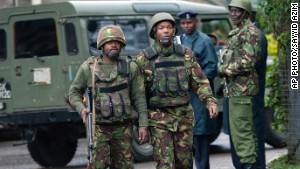
updated 3:14 PM EDT, Sun October 6, 2013
Who are the Kenya mall attackers?
STORY HIGHLIGHTS
- Al-Shabaab chief Mukhtar Abu Zubayr has a reputation for being secretive, merciless
- Zubayr, 36, wants his group to be able to deliver devastating attacks beyond Somalia
- Last year, he formally declared Al-Shabaab an affiliate of al Qaeda
- Zubayr's harsh tactics have led to dissent in his group, which he has ruthlessly suppressed
Zubayr, who is also known
as Ahmed Abdi Godane, already has a price on his head. Last year, the
U.S. State Department authorized a reward of up to $7 million for
information on his whereabouts. And Saturday, his compound in the Somali
port city of Barawe was the target of a raid by American commandos,
according to local residents. The SEALs withdrew after a fierce
firefight, and it was unclear whether their target -- still unidentified
by U.S. officials -- was dead or alive.
Zubayr's vision has been
to transform Al-Shabaab from an insurgent outfit focused on Somalia into
a terrorist group capable of devastating attacks beyond its borders. He
has already directed two -- suicide bombings against bars in Uganda's
capital Kampala in 2010, and September's Westgate mall siege in Nairobi,
Kenya.
In an audio statement
released after the siege, Zubayr noted the attack took place "just 10
days after the anniversary date of the blessed 911 operations" and
called it an "epic battle" launched to punish Kenya for the 2011
invasion that drove Al-Shabaab out of much of southern Somalia.
"We tell the Kenyan
public: You have entered into a war that is not yours and is serving
against your national interests. You have voluntarily given up on your
security and economy and lost many of your sons," Zubayr said. He warned
Kenyans that they face "a war of attrition inside your own country"
unless their government pulls its remaining forces out of Somalia. He
added that "it was also a retribution against the Western states that
supported the Kenyan invasion."
Experts who track Al-Shabaab communications say there is no reason to doubt the authenticity of the recording.
Uganda, meanwhile, has
more than 6,000 troops in Somalia as part of the African Union
peacekeeping mission supporting the transitional government in
Mogadishu. After the 2010 bombings, which killed more than 70 people,
Zubayr warned: "What happened in Kampala was just the beginning."
And with a terror resume
that now spans 15 years, he has been "ruthlessly eliminating real and
imagined rivals" within the group, according to a well-placed source in
Mogadishu with extensive knowledge of Al-Shabaab.
"Zubayr is creating Al-Shabaab 2.0," the source said.
For Zubayr, the struggle
has always been a global confrontation with "disbelievers" rather than
just about Somalia. He also vowed that his group would launch a direct
attack against the United States.
Zubayr is 36 years old,
according to most accounts, and originally from Somaliland, now a
vaguely autonomous part of northern Somalia. He is slim to the point of
wispy, as shown on the very few photographs of him, and prefers
recording audio messages to appearing in public. As a teenager, he
studied at a Pakistani madrassa, thanks to a grant from a wealthy Saudi,
and he returned home with militant beliefs and an appetite for trouble.
He was thought to have been involved in the abduction and murder of
several foreign aid workers in Somaliland, including the killing of
Italian aid worker Annalena Tonelli in 2003.
Among his close
associates in Al-Shabaab's early days was Aden Ayrow, a towering force
in the group and a ruthless and mercurial pro-al Qaeda hardliner. After
Ayrow's death in May 2008 in a U.S. strike, Zubayr asserted his
leadership of Al-Shabaab and immediately pledged allegiance to Osama bin
Laden. According to a U.S. diplomatic cable published by WikiLeaks in
2009, he once refused to discuss a military offensive against government
forces in Mogadishu with Al-Shabaab's allies until one of them
apologized for remarks he had made critical of bin Laden.
But bin Laden was wary
of a merger of al Qaeda with Al-Shabaab. About a year before his death,
he wrote to Zubayr that enemies would "escalate their anger and mobilize
against you: this is what happened to the brothers in Iraq or Algeria."
Bin Laden's deputy at
that time, Ayman al-Zawahiri, took a different view. A letter dated
December 2010, which was recovered from bin Laden's compound in
Abbottabad and was thought by researchers to have been written by
al-Zawahiri, was critical of bin Laden's decision to rebuff entreaties
by the Somali militant group.

Is situation under control in Kenya?

Victims of the Kenya attack remembered
Behind the Kenya mall massacre
"I see it to be very
essential for al Qaeda to confirm and declare its linkage with its
branches ... please reconsider your opinion not to declare the accession
of the brothers of Somalia," the author wrote.
In February of last
year, Zubayr formally declared Al-Shabaab an affiliate of al Qaeda with a
long message to al-Zawahiri, in which he said: "We will go with you as
loyal soldiers until doom and injustice disappear from Islam."
Zubayr has always
rejected any negotiations with Somalia's Transitional Federal
Government. According to another U.S. diplomatic cable leaked to
WikiLeaks, Zubayr rejected an initiative in 2009 by then-Libyan leader
Moammar Gadhafi to mediate in Somalia, telling him that once a true
Islamic government was established in Somalia, he would move on to other
countries, including Libya. He opposes elections, saying "the reality
is that democracy is something Allah made unlawful, and someone else
cannot make it lawful."
As Al-Shabaab came under
greater pressure from the African Union force stationed in Mogadishu,
Zubayr turned to suicide bombings against civilians. In December 2009,
an Al-Shabaab bomber killed 23 people at a university graduation
ceremony in Mogadishu. Some factions inside Al-Shabaab disowned the
attack, but Zubayr was unmoved. As a northerner, unlike other Al-Shabaab
commanders, he did not belong to a clan in the areas controlled by the
group and was therefore less concerned about civilian casualties.
According to a confidential U.N. assessment, Zubayr demanded more
suicide attacks to supplement conventional fighting.
His rejection of
negotiations, poor management of military campaigns and the clan system
soon led to dissent in Al-Shabaab. According to diplomatic cables in
2009, Zubayr wanted to declare an Islamic caliphate in areas controlled
by Al-Shabaab, which included much of central and southern Somalia.
Others in Al-Shabaab's leadership disagreed, saying the group had to
gain greater public support before such a move. But fearful of
assassination, they kept their counsel. The imposition of brutal
Taliban-like law eventually alienated large sections of the population
in southern and central Somalia.
One prominent Al-Shabaab member, the American Omar Hammami, said in a video last year that other elements in the group were trying to kill him.
He followed up with a series of tweets this year attacking Zubayr. "Abu
zubayr has gone mad. He's starting a civil war," he said.
Zubayr responded by
ordering the killing of Hammami, who was wounded by a gunshot in April.
His intelligence wing finally caught up with Hammami and killed him in
September, just days after he told the Voice of America that Zubayr had
"turned Al-Shabaab into an organization that oppresses Muslims in an
effort to win control of Somalia."
Even longtime supporters and friends, such as Ibrahim al Afghani, have turned against Zubayr, and paid with their lives. Al Afghani was killed in a shootout in June
in the southern town of Barowe. The Mogadishu source tells CNN that
several prominent figures in Al-Shabaab -- including Sheikh Mukhtar
Robow and Sheikh Hassan Dahir Aweys, two of its old guard -- now fear
for their lives. Zubayr's purge accelerated during the summer, leading
Aweys to negotiate his surrender to authorities, apparently for his own
protection.
After Kenyan troops
drove Al-Shabaab out of population centers in 2011, pro-al Qaeda hawks
within the group gained the upper hand. The loss of the port city of
Kismayo, the source of much of Al-Shabaab's income, weakened arguments
that the group had too much to lose by embracing al Qaeda's global
jihad.
One reason Zubayr has
emerged triumphant in these internal battles is that he controls
Al-Shabaab's intelligence wing, known as Amniyat, a ruthless entity
organized in cells and commanded by Mahad Mohamed Ali, also known as
"Karate." Counterterrorism analysts say that as other units in the group
have been weakened, Zubayr has come to rely heavily on Amniyat, into
which he has poured resources and which he sees as the kernel for
Al-Shabaab's transformation into a regional al Qaeda affiliate. And that
may ultimately be a source of vulnerability.
Zubayr's reliance on
force in an organization that has long worked as a loose collective has
made him a legion of enemies inside Somalia, and even led to criticism
on some jihadist forums sympathetic to al Qaeda. After the Westgate
attack, Kenyan and Western intelligence agencies will undoubtedly step
up efforts to end Zubayr's reign of terror. But he should not be
underestimated. A former Somali prime minister, Omar Abdirashid Ali
Sharmarke, described Zubayr as the cleverest of Al-Shabaab's leaders.
No comments:
Post a Comment